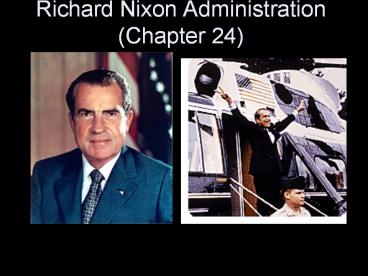Richard Nixon Administration (Chapter 24) - PowerPoint PPT Presentation
Title:
Richard Nixon Administration (Chapter 24)
Description:
Richard Nixon Administration (Chapter 24) Foreign Policy Nixon s foreign policy had at least 3 Major Successes: 1. US got out of the Vietnam War 2. – PowerPoint PPT presentation
Number of Views:396
Avg rating:3.0/5.0
Title: Richard Nixon Administration (Chapter 24)
1
Richard Nixon Administration (Chapter 24)
2
Foreign Policy
- Nixons foreign policy had at least 3 Major
Successes - 1. US got out of the Vietnam War
- 2. Visit to China leading to later recognizing
the Peoples Republic of China - 3.Arms Control with the Soviet Union
3
Nixon and Kissinger
- Nixon and Kissinger (secretary of state) began to
take advantage of the rivalry between the two
Communist giants, China and the Soviet Union. - Their diplomacy was praised for bringing about
détente, a deliberate reduction of Cold War
tensions.
4
Visit to China
- After a series of secret negotiations with
Chinese leaders, in February 1972, Nixon traveled
to Beijing. - The visit was extensively covered on television.
This trip led to the US later recognizing the
government of the Peoples Republic of China.
5
Visit to USSR
- In May, 1972, Nixon visited the Soviet Union and
met with Soviet leader, Leonid Brezhnev. - Nixon and Kissinger used the new relationship
with China to put pressure on the Soviets to
agree to a treaty limiting antiballistic
missiles. - This led to the Strategic Arms Limitations Talks
(SALT I) http//www.youtube.com/watch?vneVsSxuJ17
w
6
Economy
- During Nixons administration, the US suffered
from a combination of Inflation and Unemployment
which is called Stagflation. - Nixons cutting of the government spending
contributed to a recession.(slowdown of economy) - He also tried deficit spending (When a
government's expenditures exceed its revenues)
and later imposed a 90-day wage and price freeze
(the government declared that nobody could change
prices for 90 days)
7
Trouble in the Middle East
- October 6, 1973 Syrians and Egyptians launched
an attack on Israel in an attempt to recover
lands lost in the Six Day War in 1967. - Nixon ordered US nuclear forces on alert and we
shipped 2 billion in arms to Israel. This
helped Israel take control of the war.
http//www.nbcnews.com/video/nightly-news/51290185
51290185
8
OPEC Oil Embargo
- In response to the US support of Israel, the
Organization of Petroleum Exporting Countries
(OPEC) placed an embargo on oil sold to Israels
supporters. - This caused a worldwide shortage and long lines
at gas stations in the US
9
Nixons Paranoia
- The White House had compiled an enemies list of
prominent Americans who opposed Nixon, the
Vietnam War, or both. - People on this list were investigated by
government agencies such as the IRS. - Also, there was a group of former covert
government agents who were called plumbers.
These agents were in charge of plugging security
and information leaks in the administration. - In actuality, these agents had carried out a
series of dirty tricks against those who the
Nixon administration felt had harmed Nixon.
10
CREEP
- The Committee to Re-Elect the President (CREEP)
had also committed a series of illegal
activities. - The Democratic Party had nominated George
McGovern to run against Nixon in the 1972
election. - In June, 1972 a group of men hired by CREEP were
caught breaking into the offices of the
Democratic National Committee Headquarters at the
Watergate Complex in Washington, D.C. - These men were found guilty and sent to prison.
- Nixon overwhelmingly defeated McGovern.
11
- Two Washington Post reporters, Robert Woodward,
and Carl Bernstein, published a story claiming
these burglars had ties to the Nixon
administration. - Also, information was uncovered showing that
money and possible pardons had been promised to
the burglars in exchange for their silence.
12
Senate Investigation
- These revelations led to a Senate investigation
headed by Democratic Senator Sam Ervin of North
Carolina. - These televised hearings showed Americans that
the Nixon administration had carried out many
unethical and possibly illegal activities.
13
Cover-Up
- Through the testimony of White House lawyer, John
Dean, the president was linked to a cover-up of
the burglary. - Also Nixons top aides, H.R. Haldeman and John
Erlichman resigned to protect Nixon. - They, along with many others were later indicted
for obstructing justice.
14
- While the Senate and the Post were investigating,
Nixon appointed a special prosecutor, Archibald
Cox to investigate as well. - Alexander Butterfield testified that Nixon had
tapes of every conversation held in the Oval
Office. - This led to a year long struggle between Nixon,
who claimed executive privilege for the tapes,
and the investigators, who wanted the tapes to
prove the cover-up charges.
15
- To make matters worse, Vice President Spiro Agnew
was forced to resign in the Fall of 1973 for
having taken bribes while he was governor of
Maryland - Nixon chose Gerald Ford, a longtime member of
Congress from Michigan, to become the new Vice
President
16
Saturday Night Massacre
- Cox subpoenaed the Nixon tapes, but Nixon refused
to turn them over. - When Cox persisted, Nixon fired Cox and the US
Attorney General resigned in protest. - Leon Jaworski was appointed to replace Cox, and
he immediately demanded the tapes. - The House of Representatives now started
impeachment hearings.
17
- Nixon next turned over transcripts of the tapes,
but the Supreme Court eventually forced Nixon to
turn over the tapes - The released tapes clearly showed Nixon had
engaged in the cover-up only days after the
Watergate break-in. - The House Judiciary committee voted three
articles of impeachment obstruction of justice
abuse of power and contempt of Congress.
18
Resignation
- Faced with certain impeachment by the House, and
a trial in the Senate, Nixon resigned on August
9, 1974. - His appointed Vice President, Gerald Ford, then
took the oath of office as the first unelected
President in US history.
http//www.youtube.com/watch?vIHnmriyXYeg































